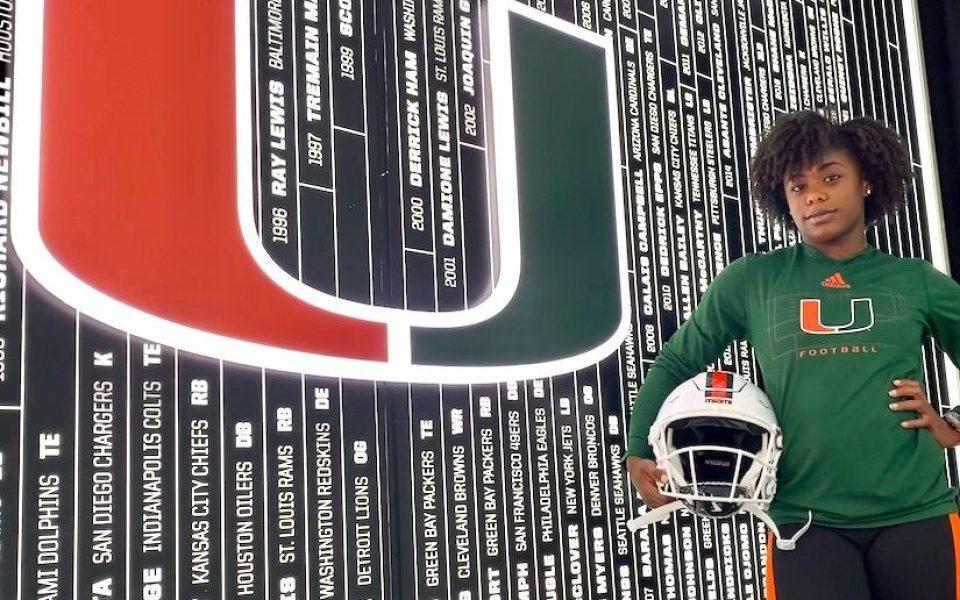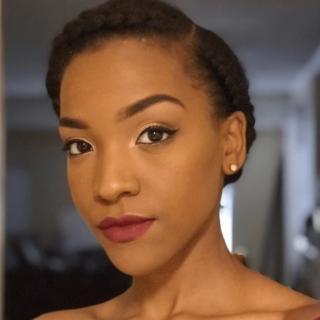Anything men can do, Mariah Pearson can do just as well.
Her summer days started before the crack of dawn, rising at 4 a.m. By 5:15, she’d arrive at the University of Miami’s Carol Soffer Indoor Practice Facility and start her duties as the Hurricanes’ football team strength and conditioning intern. She was the first woman to ever hold the position.
“It was really cool not only being a woman but being a Black woman and only being 22 at the time,” she says. “I was 21 during the interview.”
Pearson is a senior studying kinesiology at NC A&T State University. Originally from Richmond, Va., Pearson enrolled at the university because she was attracted to the successful STEM program. Since her sister attended Howard University and her cousin attended Southern University, she also wanted to keep the tradition of attending HBCUs in the family.
Pearson’s been an athlete for most of her life. In addition to being a gymnast for 13 years, she was a cheerleader and track star in middle and high school. Even so, she understood that sports are typically viewed as a “man’s world,” and the internship was just the beginning of Pearson’s effort to increase the presence of women in athletics as trainers and coaches.
“I think it’s important that women invade these spaces because they need representation,” she explains.
Neither landing the position nor being in it was no easy feat. Pearson interviewed with coaches who previously worked at the University of Oregon, and they informed her they were hesitant to bring women on staff because of previous instances of interns fraternizing with players and other inappropriate behavior at UO. Although she felt grilled through multiple rounds of interviews, Pearson understood the university just wanted to make sure she was there for the right reasons. After impressing evaluators with her previous internships, athletic experience and intelligence, she was offered the job on the spot.
According to Pearson, as an intern, she didn’t feel like a woman until her body was policed. She was given the same uniform as male interns, yet she was asked to change into looser clothing sometimes.
“When you’re a woman that’s been an athlete or somewhat attractive, you’re going to be kind of stifled a little bit more because I think the coaching staff is so afraid for the young athletes to get ‘distracted,’” she says.

Difficulties went beyond her dress; Pearson had to find alternate ways to navigate the facility and avoid the men’s locker room. These occasions inspired her to engage in uncomfortable conversations with members of leadership to improve not only her experience, but future female interns.
“Being a woman working in sports, it’s so important to question and hold people accountable for what they say,” she says.
In addition to dispelling negative stereotypes and gender bias of women in athletics, it was during a previous internship with A&T’s football team that Pearson realized she wanted to increase representation of Black women in professional football.
“Football is such a male-dominated and white male-dominated field in terms of coaching,” she says.
According to the 2023 NFL Diversity and Inclusion Report, “Between the start of the 2012 NFL season and Super Bowl LVII, NFL teams hired 62 white head coaches — 81 percent of total head coach hires. During that same time period, NFL teams only hired 15 head coaches of color — 19 percent of total head coach hires.”
This data proves Pearson’s point that in a field where the majority of players are Black, it’s important for athletes to find coaches relatable.
“An area that definitely needs improvement is being able to see yourself in your coach,” she says.
She continues, “For a lot of them, it’s hard to relate to a white man making six figures that has all this power over when they do and don’t play their sport.”
In addition to being a young Black woman, Pearson says she’s able to relate more to the athletes due to her own experience playing sports. She says she understands that as athletes test the boundaries of their bodies, injuries are bound to happen. Her experiences with concussions and constant sprained ankles piqued her interest in kinesiology, the study of human body movement. As she met with physical therapists and general practitioners, she found their work interesting.
When she arrived at A&T, she was unsure which career path to follow. She considered physical therapy, but had a change of heart and decided to take a more preventative approach to sports injuries.
“Why be the person that fixes people when they get broken when you can prevent them from getting broken in the first place?” she asks.
As UM’s strength and conditioning intern, Pearson set up the weight room for the day’s workouts. She also spent time coaching athletes by cueing their movements, correcting their posture and tracking added weight to workout bars. She learned nutrition tips and the importance of fueling properly, guiding athletes through vitamin regimens and meal plans. Pearson was so involved she almost forgot she was a student.
“In the moment of working with them during their weight-room session I never felt like an intern; I felt like a full-time coach,” she explains. “It was stuff you don’t learn from a kinesiology class.”
Pearson believes more women should secure positions in male-dominated fields and intends to do so in her career. As far as what’s next, she might pursue a graduate assistantship, or she may get a degree in nutrition. She might even purchase an NFL team later down the line. What’s certain is Pearson strives to change the way female coaches are viewed while nurturing athletes along the way.
“Creating a safe space for athletes to perform at their highest level is my ultimate goal,” she says.
Join the First Amendment Society, a membership that goes directly to funding TCB‘s newsroom.
We believe that reporting can save the world.
The TCB First Amendment Society recognizes the vital role of a free, unfettered press with a bundling of local experiences designed to build community, and unique engagements with our newsroom that will help you understand, and shape, local journalism’s critical role in uplifting the people in our cities.
All revenue goes directly into the newsroom as reporters’ salaries and freelance commissions.


Leave a Reply